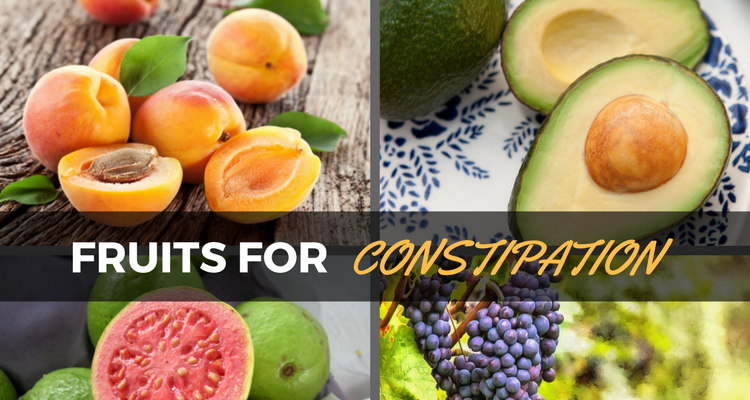
Constipation refers to irregular and tough bowel movements. Some people may have bowel movements three times a day, while others may have them three times a week. Not having any bowel movement for more than three days can cause lower abdominal discomfort and physiological distress.
There can be many causes of constipation, and the major causes are eating disorders and low fluid intake. You can prevent constipation just by increasing the intake of fluids and fibrous foods, along with exercise. Let’s take a look at some of the fruits for constipation that you should include in your diet to improve bowel movements.
16 Fruits for Constipation
Most fruits are rich in fiber and other nutrients such as vitamins and minerals. They are great to snack on whole, but if that is not possible, you can have a fresh fruit juice. While you should include a variety of seasonal fruits into your daily diet, most fruits are available throughout the year. Here are some fruits that improve digestion and help with easy bowel movements.
1. Apples
A medium apple contains four grams of dietary fiber, which accounts for 17% of the recommended daily intake. The fiber called pectin present in apples, helps soften stool and relieves constipation. They can be eaten as a snack or used in various recipes.
2. Apricots
A cup of apricot provides three grams of dietary fiber, and 60% of the recommended daily intake of vitamin A for only 74 calories. Considering the calorie and vitamin content, it is one of the best fruits that relieve constipation.
3. Avocados
Avocados are different from other fruits in terms of its high-fat and high-fiber content. A single avocado contains 13 grams of dietary fiber, and as such, is also considered one of the best fruits that relieve constipation.
It has 3,396 milligrams of omega-6 and 221 milligrams of omega-3 fatty acids, in addition to ample amounts of vitamins and minerals. The good fat from avocado can reduce your cholesterol level. You can simply spread the flesh on a whole wheat bread slice to make a sandwich.
4. Blackberries
Blackberries are one of the best fruits for constipation. A cup of it contains eight grams of dietary fiber and 62 calories. Blackberries contain a sugar called xylitol which has laxative effects.
They also have good amounts of vitamin C, vitamin A, calcium, and iron. Blackberries also have very high levels of antioxidants.
5. Blueberries
A cup of blueberries accounts to 14% of the daily recommended intake of fiber. It has good amounts of vitamin C, E, K, and manganese.
A clinical study conducted at the Lund University in Sweden showed that blueberries can ease and protect against intestinal irritation.
6. Grapes
The organic acids, sugar, and cellulose present in grapes make it one of the best fruits for constipation. A 100-gram serving of grapes provides four grams of dietary fiber and 18% each of vitamin C and K. Grapes also have a high water content that keeps you hydrated and helps regularize bowel movements.
7. Guavas
Eating one or two guavas a day can help treat constipation. The fiber and pectin in about-to-ripe guavas help regulate bowel movements, so it is one of the best fruits that relieve constipation.
The crunchy seeds give roughage to the diet and promote easy bowel movements. A single fruit provides more than twice the recommended intake of vitamin C which also helps with constipation in addition to several other health benefits.
8. Mangoes
Mangoes are one of the best fruits for constipation as they are rich in fiber, vitamin C, and water. They help stimulate bowel movements. Mangoes also have a good amount of vitamin A and are also beneficial for the skin.
9. Oranges
Oranges provide 116% of the recommended daily intake of vitamin C and 13% of dietary fiber. Vitamin C has a laxative effect which can be of great relief to constipation sufferers.
It increases the frequency of bowel movements, making the passage of stools quicker. This juicy fruit also has a good amount of water which aids in relieving constipation.
10. Papayas
Papayas have three grams of dietary fiber and more than the recommended daily intake of vitamin C, which helps in softening stools.
This fruit for constipation acts as a natural laxative and half of it must be consumed before breakfast to relieve constipation.
11. Pears
These sweet, juicy fruits for constipation have six grams of dietary fiber and seven milligrams of vitamin C. Pears are readily available and must be consumed with the skin, as the skin contains half of the fiber. Pears also have a good amount of water, which helps to relieve constipation.
12. Pineapples
A cup of pineapple provides nine percent of the recommended daily intake of fiber and 131% of vitamin C, which helps relieve constipation.
Consuming pineapple as a whole fruit, or having it in form of juice after breakfast or dinner, helps improve the digestive system.
13. Prunes
Prunes are one of the best fruits for constipation that includes both soluble and insoluble fiber. These can be consumed in the form of juice for constipation relief.
A cup of prunes provides 12 grams of dietary fiber, which helps relieve constipation. They have a good amount of vitamin A, B6, K niacin, magnesium, potassium, and manganese.
14. Raspberries
Raspberries also help relieve constipation. A cup of this fruit provides 32% of the recommended daily intake of fiber and 54% of vitamin C, which helps relieve constipation. The sweet, juicy fruit has good amounts of vitamins, minerals, and antioxidants.
15. Strawberries
A cup of whole strawberries contains three grams of dietary fiber, and more than the recommended daily intake of vitamin C. Strawberries help stimulate the functioning of the digestive system, as well as bowel movements.
16. Kiwis
One kiwi contains three grams of fiber, and has more than the recommended intake of vitamin C. Kiwis also have a good amount of water and nutrients such as folate, vitamin C, and vitamin K, among others.
Related: Coconut Water Can Provide Relief From Constipation
Bananas for Constipation: The Cause or Relief?
There are two major factors to consider before consuming bananas—their ripeness and quantity. One medium banana contains three grams of dietary fiber. A study published in Alimentary Pharmacology & Therapeutics states that soluble fiber may benefit in chronic idiopathic constipation.
Green bananas are rich in resistant starch, which functions like soluble fiber and helps with constipation. The resistant starch escapes digestion in the small intestine, and feeds the friendly bacteria in the large intestine. These bacteria produce short-chain fats, which promote digestive health and benefit metabolism. A study published in Digestive Diseases and Sciences mentions that a green banana along with pectin can treat diarrhea in children and adults.
According to a survey conducted, it was found that people believed bananas caused constipation. A study published in Pediatric Gastroenterology, Hepatology & Nutrition says that bananas can cause or aggravate preexisting constipation and is used to treat diarrhea. However, the ripening factor matters here. Green or unripe bananas contain a lot of starch that is not easy to digest. Thus, they can cause constipation. In fact, traditionally, they have been used to treat diarrhea.
On the other hand, as a banana ripens and becomes yellow, they produce pectin with the help of the pectinase enzyme. The pectin and fiber content in ripe bananas aid in reducing constipation. Also, the number of bananas you eat is important. Ideally, you should have one or two ripe bananas every day.
Fiber-Rich Foods for Constipation
1. Popcorn
This popular snack is made from a whole grain, and increasing the consumption of whole grains relieves constipation. Popcorn is a rich source of fiber and proteins. A 100-gram serving of popcorn contains 15 grams of dietary fiber. To get maximum benefits, ditch the salt and butter packaged popcorn, and opt for air-popped or stove-popped popcorn made at home.
2. Beans
A cup of kidney beans contains 11 grams of dietary fiber. Kidney beans are also a good source of iron, calcium, and proteins. These beans contain essential vitamins and minerals in good proportion. You can toss them in your salads, soups, casseroles, and pasta.
3. Multi-grain bread
A single slice of multi-grain bread contains two grams of dietary fiber. It also contains three grams of proteins, four and three percent of recommended intake of iron and calcium, respectively. You can opt for a multi-grain sandwich and increase the fiber content by adding green vegetables and bell peppers. However, be sure to read all the ingredients on the bread packaging carefully.
4. Cereals
A 100-gram serving of ready-to-eat breakfast cereals such as Cheerios has 10 grams of dietary fiber. It is a rich source of iron, proteins, and the other essential minerals and vitamins. You can make your breakfast more fibrous by adding a tablespoon of wheat bran or flaxseed, as well as some of the above-mentioned fruits for constipation.
Be sure to read the ingredients list carefully on any package of ready-to-eat cereals. They may have a high sugar content or other additives. Avoid such cereals and opt for plain cereals instead, like whole oats or plain farina without any flavorings. You can add any nuts and fruits of your choice to make your breakfast more nutritious and fiber-rich.
5. Broccoli
Broccoli is one of the richest sources of fiber. A stalk of cooked broccoli contains nine grams of fiber and has three times the recommended daily intake of vitamin C. Vitamin C also helps to relieve constipation. Raw broccoli has more fiber than cooked. If you still prefer having cooked broccoli, you can either bake it or steam it, and toss it with olive oil, salt, and pepper.
6. Nuts
Brazil nuts, peanuts, and walnuts have a good amount of fiber and help to relieve constipation. Although nuts are rich in proteins, iron, vitamins, and minerals, they must be consumed in moderation as they are packed with calories.
7. Potatoes
One medium baked potato with skin has four grams of dietary fiber. It provides 28% of the recommended daily intake of vitamin C. You can mash boiled potatoes along with the skin, add olive oil, and season it with salt and pepper.
8. Flaxseeds
Related: Does Eating Flaxseed Lower your Blood Pressure?
A tablespoon of ground flaxseeds has two grams of fiber. You can add ground flaxseeds to your soups, curries, smoothies, or salads.
Consuming the above-mentioned foods and fruits for constipation regularly can help relieve the condition. Ice cream, cheese, fried foods, frozen dinners, cookies, or other foods made from refined flours must be avoided if you have constipation. In fact, they should be avoided to maintain overall good health and weight.
Also, ensure that you keep yourself hydrated throughout the day. Water is an essential element to flush out the toxins from the body. Drinking seven to eight glasses of water a day also helps regulate bowel movements. Additionally, your physical activity and daily exercise plays a very important role in normalizing bowel movements, so make sure you get enough of that daily, too.
Related:
- What to Eat and Avoid for People with Gout
- Gastritis Diet: Foods to Eat and Avoid
- Foods to Fight Hormonal Imbalance Symptoms
- Foods for Diarrhea
Sources:
“11 Best Fruits for Constipation Relief,” Natural-Homeremedies; http://www.natural-homeremedies.org/11-best-fruits-for-constipation-relief/, last accessed March 14, 2017.
“Diets for Constipation,” Pub Med; https://www.ncbi.nlm.nih.gov/pubmed/25587519/, last accessed Mar 14, 2017













